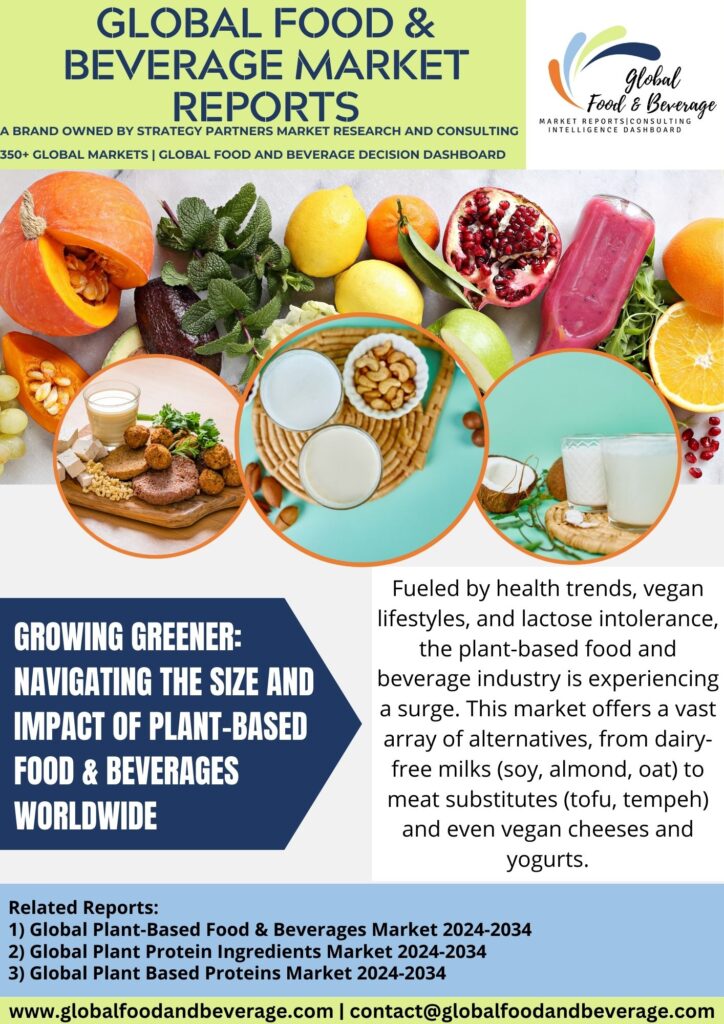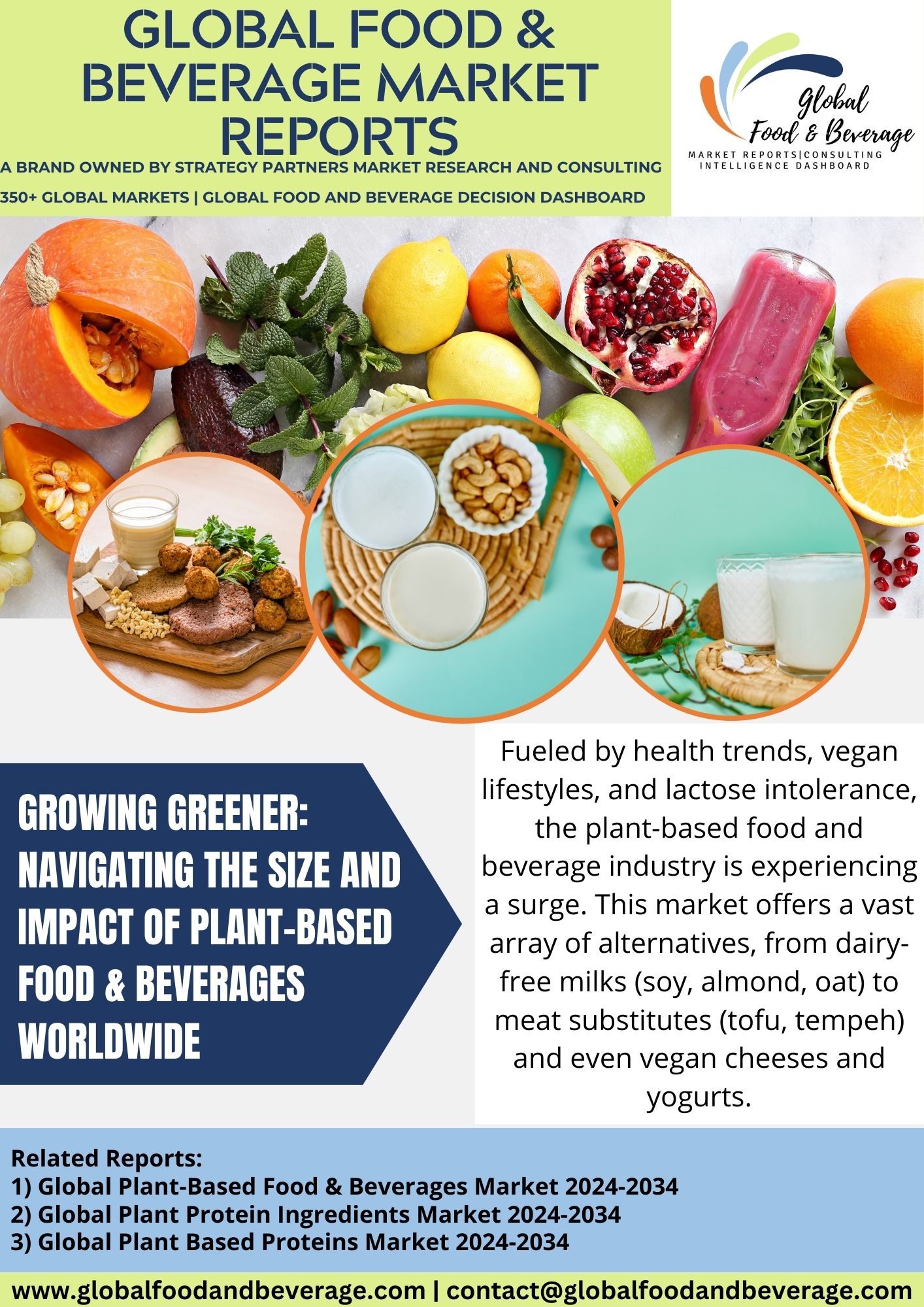Growing greener: navigating the size and impact of plant-based foods and beverages worldwide
Plant-based foods and beverages industry has experienced remarkable growth in recent years, driven by a global shift towards healthier and more sustainable lifestyles. This sector encompasses a wide range of products, including plant-based meats, dairy alternatives, snacks, and beverages, all of which are designed to cater to the increasing demand for plant-derived alternatives.

One of the key drivers of the growth in plant-based food and beverages is the rising awareness of the environmental impact of animal agriculture and the desire to reduce one’s carbon footprint. Consumers are increasingly choosing plant-based options as a more sustainable and eco-friendly alternative to traditional animal products. This trend aligns with the broader movement towards conscious consumerism, where individuals seek products that align with their values and contribute to a more sustainable future.
Health and wellness considerations also play a significant role in the popularity of plant-based products. Many consumers are adopting plant-based diets for their perceived health benefits, including lower cholesterol, reduced risk of chronic diseases, and better weight management. As a result, the plant-based food and beverages market is attracting not only vegans and vegetarians but also a growing number of flexitarians and individuals looking to incorporate more plant-based options into their diets.
The industry has witnessed a surge in innovation, with companies developing creative and flavorful plant-based alternatives that closely mimic the taste and texture of traditional animal products. This innovation has contributed to the mainstream acceptance of plant-based options, appealing to a broader consumer base.
The plant-based food and beverages market is expected to continue its expansion in the coming years, with a projected increase in product offerings and a growing presence in mainstream retail outlets. As more consumers prioritize health, sustainability, and ethical considerations in their purchasing decisions, the plant-based food and beverages sector is well-positioned for sustained growth on a global scale.
ADVANCEMENT:
The market for plant-based foods and beverages has experienced significant growth and advancements in recent years, reflecting changing consumer preferences towards healthier and more sustainable options. The size of this market has expanded considerably as more people embrace plant-based diets for reasons ranging from health and environmental concerns to ethical considerations.
Advancements in plant-based food technology have played a crucial role in improving the taste and texture of plant-based alternatives, making them more appealing to a wider audience. Innovations in food processing techniques, such as extrusion and fermentation, have allowed manufacturers to create plant-based products that closely mimic the flavors and textures of traditional animal-derived foods.
Furthermore, the increased availability of a diverse range of plant-based ingredients has fueled innovation in product development. Ingredients like soy, pea protein, jackfruit, and mushrooms are being utilized to create a variety of plant-based alternatives, from burgers and sausages to dairy-free milk and ice cream.
The growing awareness of the environmental impact of conventional animal agriculture has also contributed to the expansion of the plant-based foods and beverage market. Consumers are actively seeking sustainable alternatives, and the plant-based industry has responded by offering products that have a lower carbon footprint compared to their animal-derived counterparts.
As the global demand for plant-based options continues to rise, the market size of plant-based foodss and beverages is expected to expand further, driven by ongoing innovations, increased accessibility, and a shift towards more sustainable and ethical consumption practices.
CHALLENGE:
The plant-based foods and beverages industry, while experiencing growth, faces several challenges on a global scale. One of the foremost obstacles is the perception of taste and texture. Despite significant advancements in product development, some consumers remain skeptical about the ability of plant-based alternatives to replicate the flavors and textures of traditional animal-derived products. Convincing a broader audience about the palatability of plant-based options is crucial for wider adoption.
Affordability is another notable challenge. The production costs of plant-based products can be higher than their conventional counterparts, primarily due to the expense associated with sourcing quality plant-based ingredients. As a result, ensuring competitive pricing that appeals to a diverse consumer base becomes a persistent hurdle, limiting access for some demographics.
Supply chain issues also pose a threat to the industry. The reliance on specific crops and ingredients makes the sector vulnerable to disruptions caused by climate change, natural disasters, or geopolitical factors. Fluctuations in raw material prices and availability can impact production stability, leading to challenges in meeting growing consumer demand consistently.
In addition, regulatory complexities and varying labeling standards across regions can impede market growth. Harmonizing standards and addressing regulatory ambiguities is essential for fostering consumer trust and facilitating the seamless global expansion of plant-based food and beverages.
Overcoming these challenges requires a concerted effort from industry stakeholders, including investment in research and development, sustainable sourcing practices, and collaborative initiatives to address taste perceptions, affordability concerns, and supply chain vulnerabilities.
CONCLUSION:
In conclusion, the plant-based food and beverages market has witnessed remarkable growth, driven by a global shift towards sustainable and health-conscious lifestyles. The expanding variety of plant-based options, ranging from burgers to dairy alternatives, reflects an increasing demand for ethical and environmentally friendly choices. As consumer awareness rises, the market’s size continues to burgeon, with innovation playing a pivotal role in meeting diverse preferences. The future of plant-based offerings appears promising, fostering a more sustainable and inclusive food industry that aligns with evolving consumer values, paving the way for a robust and resilient plant-based market on a global scale.
